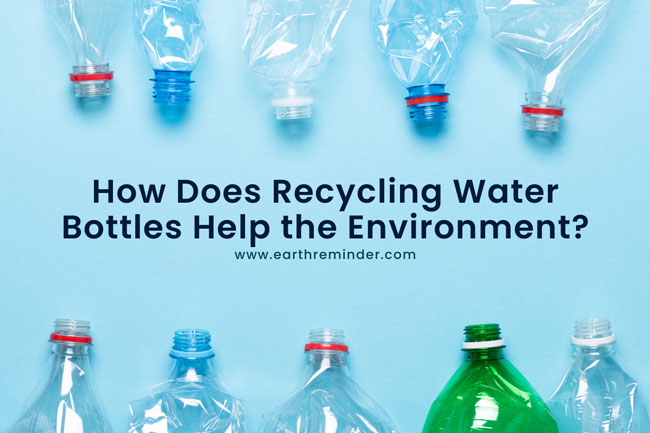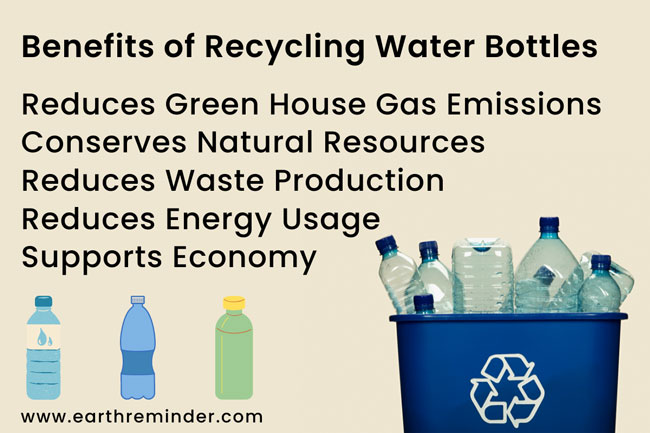How Does Recycling Water Bottles Help the Environment?
We all know that reducing our waste and taking steps to recycle more can help our planet. But do you ever wonder exactly how recycling water bottles helps the environment?
In recent years, the use of plastic water bottles has increased significantly, leading to a rise in plastic pollution and environmental degradation. Recycling water bottles is a simple but effective way to address these issues and promote sustainable consumption. In this article, we will explore the importance of water bottle recycling and the various benefits it brings to our society and the planet.
Table of Contents
Why Recycle Plastic Bottles?
In the United States, plastic water bottles are a major contributor to waste in landfills. According to the American Chemistry Council research, there are 2.5 million plastic bottles that are thrown away every hour and the average person uses 166 water bottles annually. Even though they are convenient, plastic water bottles also contribute to unnecessary waste.
So, why recycle plastic bottles? Recycling plastic bottles help reduce the amount of waste that ends up in landfills, creates new products from recycled materials, and protects our environment from pollution. Let’s understand the benefits of recycling water bottles in detail.
Also Read: 3Rs of Environment: Reduce, Reuse, and Recycle.
How Does Recycling Water Bottles Help the Environment?
Recycling water bottles help the environment by conserving natural resources, reducing energy use and greenhouse gas emissions, reducing waste, and supporting the economy. Let’s explore them in more detail.
Conserves Natural Resources
Recycling water bottles is an important practice that helps to conserve natural resources and reduce our environmental impact. When we recycle used water bottles, we reduce the demand for new raw materials such as petroleum and natural gas, which are used to manufacture new plastic bottles. This in turn reduces the need to extract and process these resources and hence conclusively conserve them.
The benefits of recycling water bottles also include conserving non-renewable natural resources like oil. According to the EPA, recycling one ton of plastic saves around 3.8 barrels of crude oil.
Reduces Energy Usage
Recyclable water bottles conserve the earth’s resources that require a lot of energy to extract. Recycling materials is more energy-efficient than creating new materials from scratch.
The recycling process involves melting down and reshaping existing plastic, rather than starting from scratch with raw materials. It takes a lot of energy to make a water bottle. In fact, the Water Footprint Network estimates that the amount of water needed to make the bottle is 6-7 times greater than what is contained within it. So, by recycling your water bottles, you are reducing the amount of energy that is used in their production.
According to the EPA, recycling one pound of PET plastic, which is commonly used in water bottles, saves around 12,000 BTUs of heat energy. PET stands for “Polyethylene Terephthalate” and BTU stands for “British Thermal Units.”
This is because the recycling process requires less energy than traditional manufacturing methods, which rely mainly on fossil fuels. By recycling water bottles, we can reduce our energy consumption and reduce the strain on traditional power grids.
Reduces Green House Gas Emissions
Recycling water bottles also helps reduce greenhouse gas emissions and combat climate change. The extraction and processing of raw materials for the production of water bottles release greenhouse gases, including CO2, which contribute to global warming and climate change.
Recycling plastic water bottles have a lower carbon footprint because it requires less energy and relies on fewer fossil fuels. Consequently, it emits fewer greenhouse gases.
These greenhouse gases are mainly emitted through the burning of fossil fuels, as well as agriculture and land use changes. Greenhouse gas emissions have increased significantly in the past century and have led to an increase in global temperatures and environmental impacts, including sea level rise, more severe weather events, and changes in ecosystems. According to EPA findings, just recycling plastic waste can reduce a household’s CO2 emissions by 340 pounds a year.
Reduces Waste Production
When we recycle used water bottles, we keep them out of landfills. This is because they can take hundreds of years to break down and release harmful chemicals into the soil and water.
Landfills pose various threats to the environment because:
- A landfill releases methane, a potent greenhouse gas, as well as other gases that contribute to smog formation and climate change.
- They also produce leachate, a liquid that can contaminate nearby water sources and harm ecosystems.
- People living and working near landfills are at higher risk of health problems and are exposed to hazards such as odor, smoke, noise, and bugs. According to a study in New York, living near hazardous waste landfills may increase the risk of congenital malformations in children by 12%.
- Landfills are often placed in minority and low-income areas that have fewer resources to oppose them and hence the land value around them decreases.
- Landfills also take up large amounts of land and destroy natural habitats for wildlife. Over 3,000 landfills are active in the United States, resulting in the loss of 1.8 million acres of habitat.
By recycling the waste generated regularly, we can contribute to solving the above problems.
Also Read: Waste Management: Principles, Methods and Benefits.
Supports Economy
Apart from all these, recycling water bottles also supports the economy in various ways:
- It reduces the amount of waste that ends up in landfills. This saves money on disposal costs.
- Recycling water bottles eliminates the need for new materials, which cuts down on production costs and supports businesses in the recycling industry.
- Recycling also supports businesses that manufacture products made from recycled plastic, such as clothing, carpeting, bottles, and construction materials.
- Recycling water bottles creates jobs in the recycling industry, which employs thousands of people in the United States and other parts of the world. These jobs range from collecting and sorting used bottles to melting down and reshaping the plastic into new products. In addition to recycling plastic water bottles, other recycling processes also contribute to the industry.
Also Read: Waste Segregation: Process and Importance.
Conclusion
In conclusion, recycling water bottles can greatly benefit the environment. It reduces waste generated from manufacturing new plastics and conserves resources by reducing energy consumption associated with plastic production, transportation, and disposal. Moreover, it prevents the littering of harmful elements that can contaminate our soil and waterways.
In the end, it is a small step that can make a huge difference in protecting our planet from further harm due to plastic pollution. So, the next time you reach for a bottle of water or another beverage container, remember to recycle it properly. As conscious consumers, we can reduce our collective impact on the world by reusing water bottles and other plastics responsibly. Taking responsibility for our actions benefits us all economically and environmentally.

